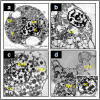Seawater acidification induced immune function changes of haemocytes in Mytilus edulis: a comparative study of CO2 and HCl enrichment
- PMID: 28165002
- PMCID: PMC5292689
- DOI: 10.1038/srep41488
Seawater acidification induced immune function changes of haemocytes in Mytilus edulis: a comparative study of CO2 and HCl enrichment
Abstract
The present study was performed to evaluate the effects of CO2- or HCl-induced seawater acidification (pH 7.7 or 7.1; control: pH 8.1) on haemocytes of Mytilus edulis, and the changes in the structure and immune function were investigated during a 21-day experiment. The results demonstrated that seawater acidification had little effect on the cellular mortality and granulocyte proportion but damaged the granulocyte ultrastructure. Phagocytosis of haemocytes was also significantly inhibited in a clearly concentration-dependent manner, demonstrating that the immune function was affected. Moreover, ROS production was significantly induced in both CO2 and HCl treatments, and four antioxidant components, GSH, GST, GR and GPx, had active responses to the acidification stress. Comparatively, CO2 had more severe destructive effects on haemocytes than HCl at the same pH level, indicating that CO2 stressed cells in other ways beyond the increasing H+ concentration. One possible explanation was that seawater acidification induced ROS overproduction, which damaged the ultrastructure of haemocytes and decreased phagocytosis.
Conflict of interest statement
The authors declare no competing financial interests.
Figures





Similar articles
-
Title: CO2 and HCl-induced seawater acidification impair the ingestion and digestion of blue mussel Mytilus edulis.Chemosphere. 2020 Feb;240:124821. doi: 10.1016/j.chemosphere.2019.124821. Epub 2019 Sep 9. Chemosphere. 2020. PMID: 31546185
-
Comparative studies on the effects of seawater acidification caused by CO₂ and HCl enrichment on physiological changes in Mytilus edulis.Chemosphere. 2016 Feb;144:2368-76. doi: 10.1016/j.chemosphere.2015.10.117. Epub 2015 Nov 22. Chemosphere. 2016. PMID: 26610296
-
BDE-47 exposure changed the immune function of haemocytes in Mytilus edulis: An explanation based on ROS-mediated pathway.Aquat Toxicol. 2017 Jan;182:58-66. doi: 10.1016/j.aquatox.2016.11.010. Epub 2016 Nov 11. Aquat Toxicol. 2017. PMID: 27871004
-
The ROS-mediated pathway coupled with the MAPK-p38 signalling pathway and antioxidant system plays roles in the responses of Mytilus edulis haemocytes induced by BDE-47.Aquat Toxicol. 2017 Jun;187:55-63. doi: 10.1016/j.aquatox.2017.03.011. Epub 2017 Mar 18. Aquat Toxicol. 2017. PMID: 28371659
-
Bioremediation of waste under ocean acidification: Reviewing the role of Mytilus edulis.Mar Pollut Bull. 2016 Feb 15;103(1-2):5-14. doi: 10.1016/j.marpolbul.2015.12.040. Epub 2016 Jan 8. Mar Pollut Bull. 2016. PMID: 26778338 Review.
Cited by
-
Bivalve Haemocyte Subpopulations: A Review.Front Immunol. 2022 Apr 8;13:826255. doi: 10.3389/fimmu.2022.826255. eCollection 2022. Front Immunol. 2022. PMID: 35464425 Free PMC article. Review.
-
Impacts of ocean acidification on carboxylated carbon nanotube effects induced in the clam species Ruditapes philippinarum.Environ Sci Pollut Res Int. 2019 Jul;26(20):20742-20752. doi: 10.1007/s11356-019-05306-8. Epub 2019 May 18. Environ Sci Pollut Res Int. 2019. PMID: 31104242
-
Molecular Features Associated with Resilience to Ocean Acidification in the Northern Quahog, Mercenaria mercenaria.Mar Biotechnol (NY). 2023 Feb;25(1):83-99. doi: 10.1007/s10126-022-10183-3. Epub 2022 Nov 22. Mar Biotechnol (NY). 2023. PMID: 36417051
-
Nutrient Alteration Drives the Impacts of Seawater Acidification on the Bloom-Forming Dinoflagellate Karenia mikimotoi.Front Plant Sci. 2021 Oct 21;12:739159. doi: 10.3389/fpls.2021.739159. eCollection 2021. Front Plant Sci. 2021. PMID: 34751224 Free PMC article.
-
Proteomic and Transcriptomic Responses Enable Clams to Correct the pH of Calcifying Fluids and Sustain Biomineralization in Acidified Environments.Int J Mol Sci. 2022 Dec 16;23(24):16066. doi: 10.3390/ijms232416066. Int J Mol Sci. 2022. PMID: 36555707 Free PMC article.
References
-
- Dupont S. & Pörtner H. O. Marine science: Get ready for ocean acidification. Nature 498, 429–429 (2013). - PubMed
-
- Caldeira K. & Wickett M. E. Oceanography: anthropogenic carbon and ocean pH. Nature 425, 365–365 (2003). - PubMed
-
- Reguera D. F., Riba I., Forja J. M. & DelValls T. Á. An integrated approach to determine sediment quality in areas above CO2 injection and storage in agreement with the requirements of the international conventions on the protection of the marine environment. Ecotoxicology 18, 1123–1129 (2009). - PubMed
-
- Bellerby R. G. J. & Golmen L. G. Report from Workshop 2, Novel Technologies (2013).
-
- Kroeker K. J., Kordas R. L., Crim R. N. & Singh G. G. Meta‐analysis reveals negative yet variable effects of ocean acidification on marine organisms. Ecol. lett. 13, 1419–1434 (2010). - PubMed
Publication types
MeSH terms
Substances
LinkOut - more resources
Full Text Sources
Other Literature Sources
Research Materials

